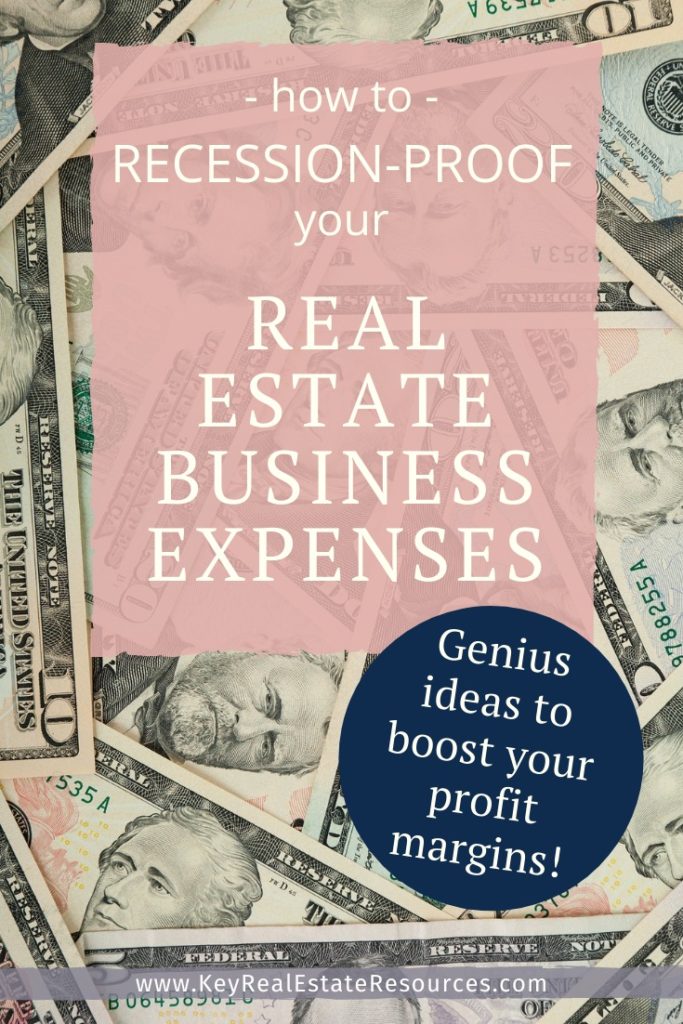A recession changes your real estate business expenses.
During the strong real estate market, when deals were closing consistently every month, we had a whole lot of wiggle room with our real estate business expenses. We didn’t have to worry about the nickels and dimes because the next deal was right around the corner. And it was actually more cost-effective to accept a few inflated expenses than to spend our valuable time micromanaging each line item of our budget.
That’s no longer the case.
Now that the next deal is uncertain, it’s worth our time to carefully evaluate every expense.
In this post, we’re going to look at your real estate business expenses and decide what needs to change to recession-proof your business.
How to Recession-Proof Your Real Estate Business Expenses
Plan Ahead
You know the next recession is coming, right? So don’t pretend it’s not. Prepare yourself for this inevitable market cycle now.
One of the best things you can do to recession-proof your real estate business expenses is to save money now (before the market takes a nose-dive). The more you can stockpile now, the less stress you’ll experience during the recession.
It’s like when you first started in the industry. You didn’t know exactly how long it would be until you got a paycheck for your first transaction. So you may have come to the industry with some savings to live on so you could survive until your deal closed. Or maybe you had a plan to use another source of income to cover living expenses back then. Do you still have that financial safety net now? If not, make sure you set aside some extra money to help you through.

Trim the Fat
With the market slowing down, it’s time to pay more attention to those nickels and dimes we mentioned a moment ago. More likely than not, your current expenses are higher than necessary. Let’s consider a few ways to reduce those expenses. They are a few key areas in which most agents can make some quick cuts that will save a small fortune.
1. Purchased Leads
Purchased leads aren’t an inherently bad thing. Many agents have built a solid business on buying leads from sites like Zillow®, and if it works for you, I’m not going to tell you it’s wrong!
But here’s my problem with it: so many agents have chosen to buy leads that the lead-generators are now able to command unreasonably expensive rates for leads. This hurts the agents paying those exorbitant rates, and it also hurts new agents who don’t yet have the budget to “pay to play”.
If you’re currently purchasing expensive leads, will you be able to continue doing so once your revenue dips?
In a recession, when fewer leads are converting to closings, agents in most markets will be better off getting back to basics. We have a whole generation of real estate agents today who don’t actually know how to prospect! And they are paying dearly for the lack of this forgotten skill.
If you need a few recession-proof prospecting ideas, check out 5 Ways to Land New Clients In a Slow Market.
2. Broker Splits and Fees
When was the last time you evaluated your agreement with your Broker?
If you’ve been a productive agent, now is probably a good time to renegotiate your commission split as well as any fees your Broker charges (desk fees, advertising, utilities, etc). Your Broker is going to struggle with profit margins the same way you are. And if you have a track record of consistent production, your Broker would probably rather take a smaller cut from your transactions than to risk losing you to another brokerage.
3. Bloated Operations
Are you paying too much for office space? Cell phone service? Transaction Coordination? Software subscriptions? Your vehicle?
When it comes to these operational expenses, you have a few options:
- Eliminate the expense completely (if practical). For example, you may find that you have more time with fewer transactions, so you can handle your transactions on your own and eliminate the expense of outsourcing to a transaction coordinator service.
- Negotiate a deal. You negotiate for a living. That’s one of a real estate agent’s most important responsibilities. So get on the phone and put your negotiation skills to the test to get a better rate on the services you need to keep.
- Down-size to a less expensive package. If you can’t eliminate the expense or negotiate a deal, consider changing your service to a lower price bracket. This may apply to many of your software subscriptions. With fewer new leads coming in, a cheaper plan might serve your needs perfectly well through the recession.
Run through your budget for the last year. Evaluate every line item to determine if that expense can be eliminated, negotiated, or down-sized.
Where to Spend Smarter
There are two key areas in which you don’t necessarily want to spend less, but you most definitely want to spend smarter: Marketing and Personnel.
Marketing
The typical agent cuts their marketing budget when they cut their other expenses (sometimes before they cut their other expenses). Their thought process is that operational expenses like office space and phone plans are necessary, but marketing is optional.
Those agents aren’t wrong, exactly…but prioritizing your marketing budget during a recession has some distinct advantages.
What if you spend more on marketing while every other local agent spends less? Your ads would be competing with fewer ads from other agents, and your local market share would skyrocket! You’d enjoy greater recognition and exposure than you would in a strong market when every agent is using their full marketing budget.
The key is to make sure you’re getting a solid return on your marketing dollars. And this might mean reevaluating your marketing strategy.
Print ads and radio spots are still strong performers in many markets. As are inexpensive mailers and door-hangers (when done consistently over time). Social media advertising is also highly cost-effective in most markets. And if you don’t already have a blog on your website, now is the time to start blogging for free real estate leads.

Personnel
I’m not going to tell you to fire your staff because of the recession. I am going to tell you that every member of your staff needs to pull his or her own weight to justify keeping him or her on the payroll during a recession.
If you’ve been carrying dead weight on your team, now is the time to cut those people free. With fewer transactions coming through, you’ll be able to maintain your high standards of service with fewer people.
If, on the other hand, you have a stellar staff, taking care of them will naturally be a financial priority for you. I’m sure you want to do whatever you can to keep your staff and to keep their pay/hours at a reasonable rate.
The best way to maintain your existing personnel through a recession is to shift their responsibilities to income-generating activities. This could be prospecting for more leads and setting appointments with buyers and sellers.
Or you could get more creative…
Have you considered adding services to your real estate business that generate income separate from real estate transactions?
Adding recession-proof income streams to your real estate business is a genius way to utilize your staff through the recession. Consider services like:
- Property Management
- Property Tax Appeals
- Credit Repair (for buyers who struggle to qualify for a loan)
These services create independent income streams while simultaneously bringing you more real estate clients, keeping you in front of existing clients, and boosting your authority as the local expert.
Other options for utilizing personnel
If you can’t afford to keep your staff employed on a salaried or hourly basis, consider offering a commission-based pay structure. Your staff would have the opportunity to stay on, earning a reasonable share of any incoming commissions. This obviously won’t be ideal for everyone, but it may be a better alternative for your employees than unemployment. And it may be a better alternative for you than losing your employees. In difficult economic conditions, difficult measures may need to be taken.
One more option to consider is a Virtual Assistant (VA). If you’re not able to handle the workload alone, but you’re not able to afford an in-office assistant, a VA might be the right solution for you. VAs can:
- Manage your social media (just give them a social media content calendar so they know what to post and when)
- Send follow-up emails and texts to the leads on your CRM
- Handle the admin side of any of your additional real estate service offerings
- Publish your blog posts (formatting, adding images, managing comments, etc.)
- And even write your blog posts (if they’re skilled writers who know the market, understand basic SEO, and have a strong blog content calendar to follow)
VAs are very easy to find, but to find an exceptional VA, you’re going to need to invest a little time and money in your search. Reva Global is a solid resource for well-trained VAs, specifically for the real estate industry. You could also create a post for a VA in your social media groups to find industry insiders who offer VA services. Then vet the heck out of them. Give your top choices a simple assignment with a tight deadline to test their ability to follow instructions and deliver.
The Bottom Line
Recession-proofing your real estate business expenses isn’t easy. But it’s a necessary part of surviving a slow real estate market.
Start small and start early. Make your no-brainer expense cuts today. And schedule an hour or two every month to look over your changing expenses so you can decide when and where additional changes need to be made.
You’ll probably find that you’re able to make several completely painless cuts. You can save the more dramatic cuts for a little later. Just make sure you’re regularly evaluating your finances so you can make the necessary changes before it’s too late.
Get Your Complete Recession-Proof Guide!
If you’re serious about growing your real estate business during a slow market, check out The Recession-Proof Real Estate Agent. This book offers a complete step-by-step guide to recession-proofing your real estate business.











